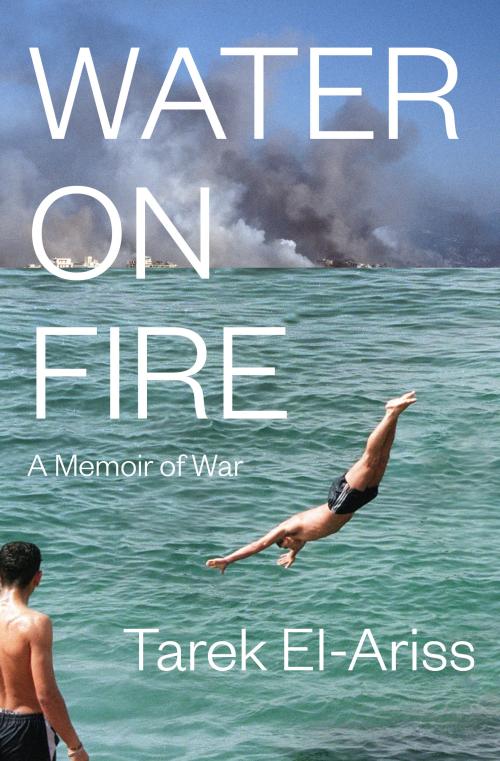“[A] stirring memoir…[El-Ariss] pays homage to the philosophies, specters, and natural elements that composed what he calls ‘the fragmented world that I had come from and that was chasing me wherever I went.’” —New York Times Book Review
“Full of heart and resilience, Water on Fire is a must-read memoir.” —Book Riot, The Best New Nonfiction Books to Read This Month
“Poignant, thought-provoking…The author’s prose is beautifully evocative.” —Kirkus Reviews
“Deeply moving…An important, stirring memoir that effectively documents how the Lebanese Civil War impacted a child who grew up there during that time.” —Library Journal
“Born out of a love with the waters of the Mediterranean and the swimmers who dot its shore, Tarek El-Ariss’s memoir…is a deep dive into civil war Beirut and the stories of the families who chose to stay… El-Ariss examines his life through its painful ruptures. Yet, in confronting Beirut, he refuses to label his past experiences as traumatic—retaining the stubbornness and the bravery of those Beirutis who still went to the beach.” —Harvard Review
“Striking…at once a bildungsroman and a regional account of the biblical, mythical, and historical characters that have defined the Arab culture. Like patches from a battered quilt, El-Ariss reveals vivid memories set in the kitchen of his childhood home, the refuge of beach resorts, and the thuggish roads of Beirut…each is a beautiful snapshot of El-Ariss’s darkest and most turbulent experiences, told with an emotional and kind sincerity…To read Water on Fire is to peek into the storied soul of a radically optimistic scholar whose skin has been toughened by scars of conflict.” —Brooklyn Rail
“El-Ariss invites us into his world at a moment of profound personal crisis…we begin to understand that the war is the wound, and the scars run deeper than his academic pursuits have allowed him to acknowledge.” —World Literature Today
“[A] layered, moving memoir…that grapples not only with loss but with the sustaining elements of life: family, friendship, art, music, shared meals, passions and pleasures great and small. The departed breathe again in its pages; language becomes one more means of survival. The result is a vibrant, memorable work that is resolutely alive.” —Michigan Quarterly Review
“How do we live with war or recover from war? And what if there is more than one war, or even a lifetime of war? There’s an erudition that almost hides itself in this dazzling memoir as El-Ariss takes on these questions, and the result is an adventure among the myths that rule us, an education in Freud, and a dive into the idea of what it could mean to be traumatized and to heal. Deeply moving, funny, erudite, each page is honed to a careful edge—not an extra word. I was dazzled.” —Alexander Chee, author of How to Write an Autobiographical Novel
“With mesmerizing prose, Tarek El-Ariss plunges us into the normalcy and lunacy of life in war-torn Beirut, with the smells of cooking and suntan oil, the pain of loss, home, bullets, and exile. Drenched in history, poetry, and emotion, it is a universal tale of survival in adversity, of trauma as growth, of sexuality as defiance. More than a memoir, it is an ode to a city that is the world’s petri dish.” —Kim Ghattas, author of Black Wave
“In this beautifully written book, Tarek El-Ariss takes his readers on a journey of discovery of one’s identity, commitment to humanity, and sorrows and ambitions, drawing a vivid picture of life at war from Beirut to New York. A must-read book!” —Alaa Al Aswany, author of The Yacoubian Building
“Water on Fire is a poetic testimony to the entanglement of memory and war, an eloquent reflection on the singular experience of recall marked by the violence, and vibrance, of the author’s Lebanese childhood. Drawing on biblical and Quranic stories, Greek myth, and legend, El-Ariss interweaves his personal story and the region’s complex history with an ongoing reflection on the nature of memory as it expresses itself in the unfolding of a life. Shaped from the beginning by his own experiences on the beach during war, El-Ariss beautifully describes and enacts a memory regulated by ‘the movement of water going in and out of rocky clusters.’ This is, at the same time, a difficult and insistent task, occasioned by the bullet lodged in his childhood friend’s head, ‘which scars me and allows me to remember and to forget.’ El-Ariss’s book is a moving and profound meditation on the intricacies of a life that ultimately ‘embrac[es]’ war even while it continues the joyful play of a child on the edge of the sea.” —Cathy Caruth, author of Unclaimed Experience: Trauma, Narrative, and History
“Water on Fire is not a common story of war, loss, displacement, and identity crises, as much as it is a way to trace their inheritance. Tarek El-Ariss tells us that ‘cutting’ and ‘storytelling’ are the same word in Arabic (qass), and discovers that the impossibility of mourning cannot be reconciled through mere descriptive remembering of events. Rather, this reconciliation demands recalling images and fictional characters from scattered books, where literature can make reality of geography, disorder, and vulnerability.” —Iman Mersal, author of The Threshold: Poems
“A beautiful and very moving book.” —Abdellah Taïa, author of A Country for Dying
“I can see this little boy carrying water containers home, or swimming at the beautiful beach in Beirut. Playing in shorts or carrying his bag on the way to school. As I read his story, I can’t help but wish for him to escape the bombs. Not only because I know this war, and this city, but also because I deeply understand how alone he feels under an abandoned sky. As an adult, Tarek El-Ariss will weave from his trauma, from this water and this fire, the words that tie in the solitude of a stranger in awe of reason with the joy of knowledge and discovery.” —Hoda Barakat, author of Voices of the Lost

